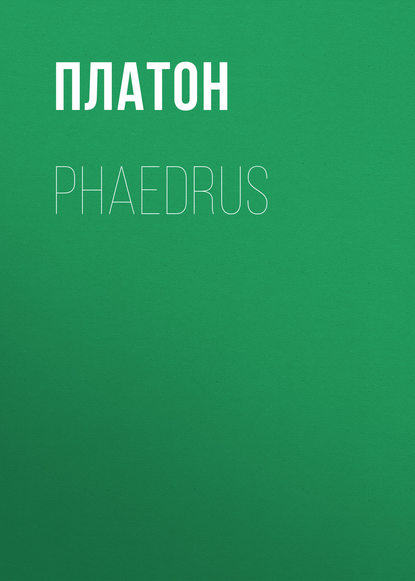По всем вопросам обращайтесь на: info@litportal.ru
(©) 2003-2024.
✖
Phaedrus
Настройки чтения
Размер шрифта
Высота строк
Поля
PHAEDRUS: Certainly.
SOCRATES: And when the orator instead of putting an ass in the place of a horse, puts good for evil, being himself as ignorant of their true nature as the city on which he imposes is ignorant; and having studied the notions of the multitude, falsely persuades them not about 'the shadow of an ass,' which he confounds with a horse, but about good which he confounds with evil, – what will be the harvest which rhetoric will be likely to gather after the sowing of that seed?
PHAEDRUS: The reverse of good.
SOCRATES: But perhaps rhetoric has been getting too roughly handled by us, and she might answer: What amazing nonsense you are talking! As if I forced any man to learn to speak in ignorance of the truth! Whatever my advice may be worth, I should have told him to arrive at the truth first, and then come to me. At the same time I boldly assert that mere knowledge of the truth will not give you the art of persuasion.
PHAEDRUS: There is reason in the lady's defence of herself.
SOCRATES: Quite true; if only the other arguments which remain to be brought up bear her witness that she is an art at all. But I seem to hear them arraying themselves on the opposite side, declaring that she speaks falsely, and that rhetoric is a mere routine and trick, not an art. Lo! a Spartan appears, and says that there never is nor ever will be a real art of speaking which is divorced from the truth.
PHAEDRUS: And what are these arguments, Socrates? Bring them out that we may examine them.
SOCRATES: Come out, fair children, and convince Phaedrus, who is the father of similar beauties, that he will never be able to speak about anything as he ought to speak unless he have a knowledge of philosophy. And let Phaedrus answer you.
PHAEDRUS: Put the question.
SOCRATES: Is not rhetoric, taken generally, a universal art of enchanting the mind by arguments; which is practised not only in courts and public assemblies, but in private houses also, having to do with all matters, great as well as small, good and bad alike, and is in all equally right, and equally to be esteemed – that is what you have heard?
PHAEDRUS: Nay, not exactly that; I should say rather that I have heard the art confined to speaking and writing in lawsuits, and to speaking in public assemblies – not extended farther.
SOCRATES: Then I suppose that you have only heard of the rhetoric of Nestor and Odysseus, which they composed in their leisure hours when at Troy, and never of the rhetoric of Palamedes?
PHAEDRUS: No more than of Nestor and Odysseus, unless Gorgias is your Nestor, and Thrasymachus or Theodorus your Odysseus.
SOCRATES: Perhaps that is my meaning. But let us leave them. And do you tell me, instead, what are plaintiff and defendant doing in a law court – are they not contending?
PHAEDRUS: Exactly so.
SOCRATES: About the just and unjust – that is the matter in dispute?
PHAEDRUS: Yes.
SOCRATES: And a professor of the art will make the same thing appear to the same persons to be at one time just, at another time, if he is so inclined, to be unjust?
PHAEDRUS: Exactly.
SOCRATES: And when he speaks in the assembly, he will make the same things seem good to the city at one time, and at another time the reverse of good?
PHAEDRUS: That is true.
SOCRATES: Have we not heard of the Eleatic Palamedes (Zeno), who has an art of speaking by which he makes the same things appear to his hearers like and unlike, one and many, at rest and in motion?
PHAEDRUS: Very true.
SOCRATES: The art of disputation, then, is not confined to the courts and the assembly, but is one and the same in every use of language; this is the art, if there be such an art, which is able to find a likeness of everything to which a likeness can be found, and draws into the light of day the likenesses and disguises which are used by others?
PHAEDRUS: How do you mean?
SOCRATES: Let me put the matter thus: When will there be more chance of deception – when the difference is large or small?
PHAEDRUS: When the difference is small.
SOCRATES: And you will be less likely to be discovered in passing by degrees into the other extreme than when you go all at once?
PHAEDRUS: Of course.
SOCRATES: He, then, who would deceive others, and not be deceived, must exactly know the real likenesses and differences of things?
PHAEDRUS: He must.
SOCRATES: And if he is ignorant of the true nature of any subject, how can he detect the greater or less degree of likeness in other things to that of which by the hypothesis he is ignorant?
PHAEDRUS: He cannot.
SOCRATES: And when men are deceived and their notions are at variance with realities, it is clear that the error slips in through resemblances?
PHAEDRUS: Yes, that is the way.
SOCRATES: Then he who would be a master of the art must understand the real nature of everything; or he will never know either how to make the gradual departure from truth into the opposite of truth which is effected by the help of resemblances, or how to avoid it?
PHAEDRUS: He will not.
SOCRATES: He then, who being ignorant of the truth aims at appearances, will only attain an art of rhetoric which is ridiculous and is not an art at all?
PHAEDRUS: That may be expected.
SOCRATES: Shall I propose that we look for examples of art and want of art, according to our notion of them, in the speech of Lysias which you have in your hand, and in my own speech?
PHAEDRUS: Nothing could be better; and indeed I think that our previous argument has been too abstract and wanting in illustrations.
SOCRATES: Yes; and the two speeches happen to afford a very good example of the way in which the speaker who knows the truth may, without any serious purpose, steal away the hearts of his hearers. This piece of good-fortune I attribute to the local deities; and, perhaps, the prophets of the Muses who are singing over our heads may have imparted their inspiration to me. For I do not imagine that I have any rhetorical art of my own.
PHAEDRUS: Granted; if you will only please to get on.
SOCRATES: Suppose that you read me the first words of Lysias' speech.
PHAEDRUS: 'You know how matters stand with me, and how, as I conceive, they might be arranged for our common interest; and I maintain that I ought not to fail in my suit, because I am not your lover. For lovers repent – '
SOCRATES: Enough: – Now, shall I point out the rhetorical error of those words?
PHAEDRUS: Yes.
SOCRATES: Every one is aware that about some things we are agreed, whereas about other things we differ.
PHAEDRUS: I think that I understand you; but will you explain yourself?
SOCRATES: When any one speaks of iron and silver, is not the same thing present in the minds of all?
SOCRATES: And when the orator instead of putting an ass in the place of a horse, puts good for evil, being himself as ignorant of their true nature as the city on which he imposes is ignorant; and having studied the notions of the multitude, falsely persuades them not about 'the shadow of an ass,' which he confounds with a horse, but about good which he confounds with evil, – what will be the harvest which rhetoric will be likely to gather after the sowing of that seed?
PHAEDRUS: The reverse of good.
SOCRATES: But perhaps rhetoric has been getting too roughly handled by us, and she might answer: What amazing nonsense you are talking! As if I forced any man to learn to speak in ignorance of the truth! Whatever my advice may be worth, I should have told him to arrive at the truth first, and then come to me. At the same time I boldly assert that mere knowledge of the truth will not give you the art of persuasion.
PHAEDRUS: There is reason in the lady's defence of herself.
SOCRATES: Quite true; if only the other arguments which remain to be brought up bear her witness that she is an art at all. But I seem to hear them arraying themselves on the opposite side, declaring that she speaks falsely, and that rhetoric is a mere routine and trick, not an art. Lo! a Spartan appears, and says that there never is nor ever will be a real art of speaking which is divorced from the truth.
PHAEDRUS: And what are these arguments, Socrates? Bring them out that we may examine them.
SOCRATES: Come out, fair children, and convince Phaedrus, who is the father of similar beauties, that he will never be able to speak about anything as he ought to speak unless he have a knowledge of philosophy. And let Phaedrus answer you.
PHAEDRUS: Put the question.
SOCRATES: Is not rhetoric, taken generally, a universal art of enchanting the mind by arguments; which is practised not only in courts and public assemblies, but in private houses also, having to do with all matters, great as well as small, good and bad alike, and is in all equally right, and equally to be esteemed – that is what you have heard?
PHAEDRUS: Nay, not exactly that; I should say rather that I have heard the art confined to speaking and writing in lawsuits, and to speaking in public assemblies – not extended farther.
SOCRATES: Then I suppose that you have only heard of the rhetoric of Nestor and Odysseus, which they composed in their leisure hours when at Troy, and never of the rhetoric of Palamedes?
PHAEDRUS: No more than of Nestor and Odysseus, unless Gorgias is your Nestor, and Thrasymachus or Theodorus your Odysseus.
SOCRATES: Perhaps that is my meaning. But let us leave them. And do you tell me, instead, what are plaintiff and defendant doing in a law court – are they not contending?
PHAEDRUS: Exactly so.
SOCRATES: About the just and unjust – that is the matter in dispute?
PHAEDRUS: Yes.
SOCRATES: And a professor of the art will make the same thing appear to the same persons to be at one time just, at another time, if he is so inclined, to be unjust?
PHAEDRUS: Exactly.
SOCRATES: And when he speaks in the assembly, he will make the same things seem good to the city at one time, and at another time the reverse of good?
PHAEDRUS: That is true.
SOCRATES: Have we not heard of the Eleatic Palamedes (Zeno), who has an art of speaking by which he makes the same things appear to his hearers like and unlike, one and many, at rest and in motion?
PHAEDRUS: Very true.
SOCRATES: The art of disputation, then, is not confined to the courts and the assembly, but is one and the same in every use of language; this is the art, if there be such an art, which is able to find a likeness of everything to which a likeness can be found, and draws into the light of day the likenesses and disguises which are used by others?
PHAEDRUS: How do you mean?
SOCRATES: Let me put the matter thus: When will there be more chance of deception – when the difference is large or small?
PHAEDRUS: When the difference is small.
SOCRATES: And you will be less likely to be discovered in passing by degrees into the other extreme than when you go all at once?
PHAEDRUS: Of course.
SOCRATES: He, then, who would deceive others, and not be deceived, must exactly know the real likenesses and differences of things?
PHAEDRUS: He must.
SOCRATES: And if he is ignorant of the true nature of any subject, how can he detect the greater or less degree of likeness in other things to that of which by the hypothesis he is ignorant?
PHAEDRUS: He cannot.
SOCRATES: And when men are deceived and their notions are at variance with realities, it is clear that the error slips in through resemblances?
PHAEDRUS: Yes, that is the way.
SOCRATES: Then he who would be a master of the art must understand the real nature of everything; or he will never know either how to make the gradual departure from truth into the opposite of truth which is effected by the help of resemblances, or how to avoid it?
PHAEDRUS: He will not.
SOCRATES: He then, who being ignorant of the truth aims at appearances, will only attain an art of rhetoric which is ridiculous and is not an art at all?
PHAEDRUS: That may be expected.
SOCRATES: Shall I propose that we look for examples of art and want of art, according to our notion of them, in the speech of Lysias which you have in your hand, and in my own speech?
PHAEDRUS: Nothing could be better; and indeed I think that our previous argument has been too abstract and wanting in illustrations.
SOCRATES: Yes; and the two speeches happen to afford a very good example of the way in which the speaker who knows the truth may, without any serious purpose, steal away the hearts of his hearers. This piece of good-fortune I attribute to the local deities; and, perhaps, the prophets of the Muses who are singing over our heads may have imparted their inspiration to me. For I do not imagine that I have any rhetorical art of my own.
PHAEDRUS: Granted; if you will only please to get on.
SOCRATES: Suppose that you read me the first words of Lysias' speech.
PHAEDRUS: 'You know how matters stand with me, and how, as I conceive, they might be arranged for our common interest; and I maintain that I ought not to fail in my suit, because I am not your lover. For lovers repent – '
SOCRATES: Enough: – Now, shall I point out the rhetorical error of those words?
PHAEDRUS: Yes.
SOCRATES: Every one is aware that about some things we are agreed, whereas about other things we differ.
PHAEDRUS: I think that I understand you; but will you explain yourself?
SOCRATES: When any one speaks of iron and silver, is not the same thing present in the minds of all?

















